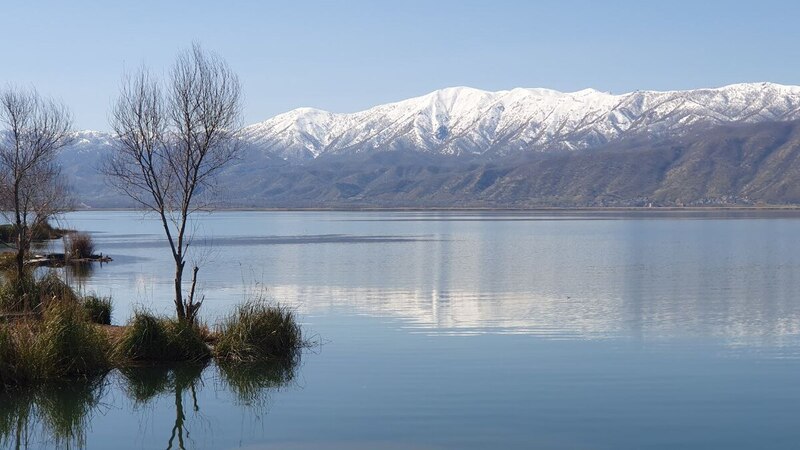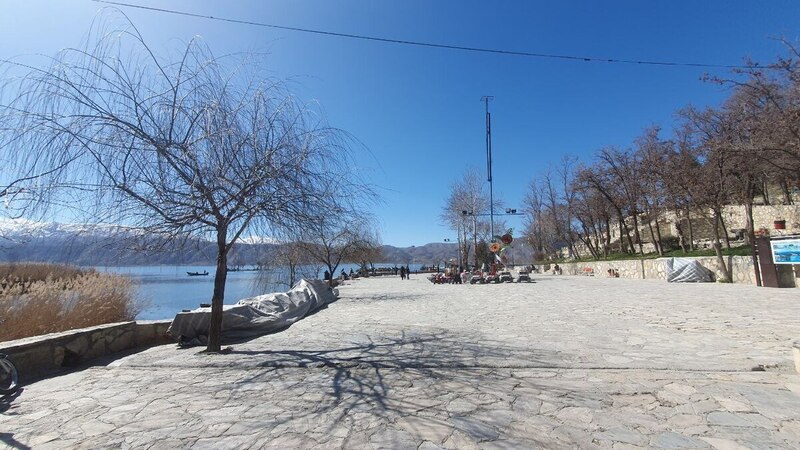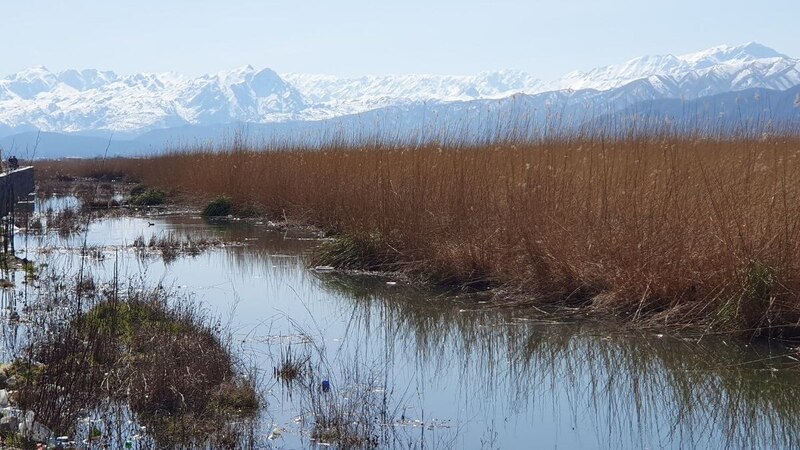Two kilometers northwest of Marivan, near a green and fertile plain, there is a small permanent lake that adorns and purifies this part of Kurdistan. The people of Marivan have been calling this lake "Zrebar" for many years. In the dictionary "Khal" for the meaning of the word Zrebar is written: "Zrebar" refers to a land that has flowed and becomes a lake. This interpretation is called a "graben" in geological terms. Researchers in this field talk about landslides in this area tens of thousands of years ago in their research on Zrebar and the Marivan plain. Scientific research says that Zrebar was formed by landslides, called grabens. According to experts, the lake dates back to the second geological period and is considered the world's largest freshwater lake.

The lake is located 1,285 meters above sea level, between 32/35 latitude and 8/48 longitude, and is a type of techno Nic lake. The size of the lake varies due to climate change in rainy and low-rainfall years. It covers an area of 20 square kilometers in the rainy seasons and decreases to 6 to 7 square kilometers during the dry seasons. The depth of Zrebar varies according to the rainfalls, but on average it is five meters deep and the width of this lake generally varies between 800 and 900 dunums. The water of Zrebar originates from dozens of underwater springs (Malaki, 2017: 130). In recent years, due to drought and lack of rainfall, the water of Zrebar has decreased and to prevent Zrebar from drying up, they have been adding part of the water of the Great River, or Belu River (Qizilcha) to Zrebar. It should be noted that a stream used to separate from the water of Zrebar and flowed from the Marivan plain to the Sirwan River, but in 1996, they built a dam on this stream and turned Zrebar into a dam. According to most environmental experts, the construction of this dam was a mistake and has had a negative impact on the water and environment of Zrebar. The water of Zrebar contains many species of fish and the marshes around Zrebar have become a favorable habitat for hundreds of species from birds and animals, like ducks, geese, Quring, and to pigs and seals around the lake.

For many years, the gentle waves of Zrebar Lake have caressed the Marivan plain. The cool wind of Zrebar with its beauty of colorful scenery captivates the heart of every tired traveler and makes them fall in love with its wet and pure face, fragrance, and sensual taste. The beautiful and unique scenery of Zrebar Lake, the world's largest natural source, has attracted tourists for many years, and thousands of tourists from all parts of Kurdistan, Iran, and the world visit Marivan and Zrebar every year.
The word “Zrebar” is a name given to this natural phenomenon by the inhabitants of the Marivan plain. "Zrebar" is the name of this lake and it is a Toponym, therefore we should mention here the geographical names that are considered an important part of people's cultural treasures and are known as "live history" (Kheirandish, 2003: 3-4).

Toponym is derived from the Greek word topo, which means "place" and noma, meaning "name" (Oxford Dictionary, 2004). Place names are given to the geographical area or natural place in which they live by the people living in that place and region under the influence of a variety of factors. To find the most accurate names for Toponym, it is necessary to first find out what people living in or around the place call them. Then look at printed and recorded sources. As we know, the people of the Marivan plain and its towns and villages have long called this natural phenomenon "Zrebar", and in ancient books and sources, this phenomenon has been called "Zrebar". The word "Zrebar" is a compound word, consisting of two parts: "Zre+bar". The first part of this word, “zre”, means sea in all Kurdish dictionaries. In addition, in ancient Iranian languages, especially in Palavi, “Zre” means sea in the same way as the word “Zrebar”. The second part "bar" could be one of the old Kurdish suffixes that have different meanings like "banks and side" in the word "Rubar" which means "banks of a river" "like", or "like a river". It also means "shape" in the word "Labar" meaning "nice or favorable (in form and shape) and in the word "Nabar" which means "badly formed or shaped". The Persian Dictionary "Amid," writes about the suffix “bar”: “Bar: (Pahlavi) bār is one of the suffixes that comes at the end of some words and means banks or full like words "Jooybar, Daryabar, roodbar,zangbar (Amid Dictionary.V1.P 292 ). Therefore, according to what mentioned, the compound word “Zrebar” means “in the shape of the sea” or “like the sea”.

The magical scenery of Zrebar has always amazed the people of Marivan, how the lake was formed has become a mystery. It has always occupied their minds, so from their perspective, people have created a legend about the formation of Zrebar as follows: The "Darwesh Legend" is an ancient legend about Zrebar in Marivan. The ancestors tell us the story of how Zrebar was formed. This legend tells of a city that was flooded by the oppression of a king and went under the Zrebar water. The evil king of the city was named Failaqus, who was drowned and his city sunk under the water of Zrebar because of the prayers of a monk (Darwesh). There is still a grave on a hill on the northeast side of Zrebar that is said to be the grave of the monk who prayed.

The monk's shrine
Source:
- Malaki, Hessam (2017) Geography of Marivan, Marivan, Evin Publishing House.
- Khairandish, Abdul Rasul (2001) Morphology of Local Histories, The Book of Month, History, and Geography, Fifth Year, No. 46 and 47. and August and September: 41 – 3.









